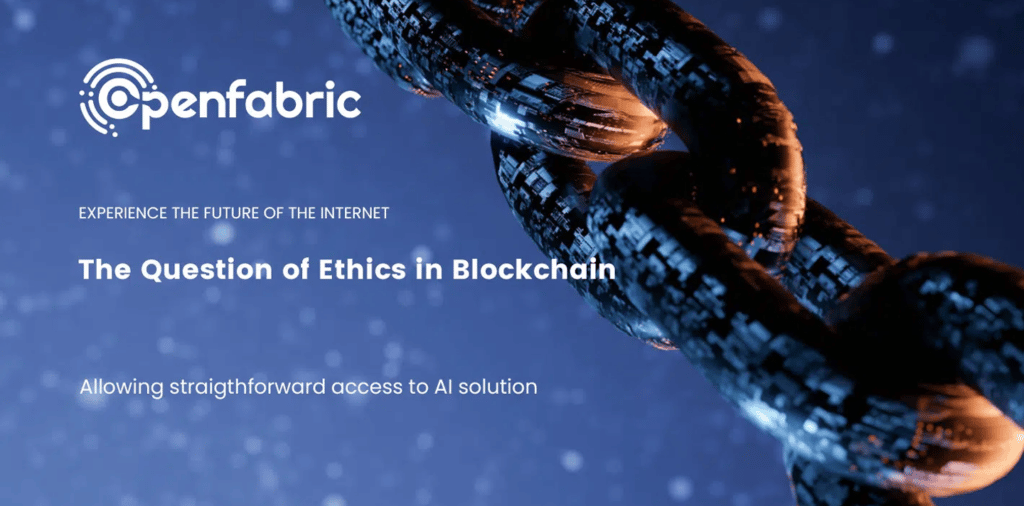
September 6, 2022 5 minutes read
The Question of Ethics in Blockchain

As with every technology and new development, blockchain has also faced its fair share of criticism and concerns. Most of these concerns revolve around the security, privacy, efficiency, and integrity of the system. The decentralized nature of blockchain and the lack of any central regulatory authority also makes some people anxious regarding the functioning and reliability of blockchain.
True Decentralization – Is It Possible?
The first and foremost concern of critics regarding blockchain technology is the decentralization aspect. Even though the majority of the blockchains are architecturally decentralized, it has been observed that a selected group of individuals like ‘core developers’ have a great influence on the working of the system. This is especially true in the case of Ethereum. The 2016 DAO hack and how it was dealt with is a prime example of this. In that instance, the core developers successfully advocated for a hard fork to recover the stolen funds. In contrast to this, just a couple of years later, the Parity bug case resulted in an even larger amount of money getting ‘frozen’. While the owners of the frozen money advocated for another hard fork similar to the one done in 2016, the core developers refused and the money remained inaccessible.
These events really highlight how the decision-making power rests within a small group instead of the community as a whole. This group may bring their biases with them and pose serious challenges. Even permissioned blockchains like the Facebook product Libra are not free from this concern. Membership in the Libra Association is limited to just a few elite individuals. This, along with Facebook’s checkered history of managing user privacy does not bode well with the blockchain community.
Ethical Code of Conduct
Nearly every profession has its code of conduct and list of ethical standards that binds practitioners regarding the decision-making in that particular profession. Since blockchain is still in its infancy, such a moral code for the technology does not exist yet. This can lead to human biases becoming a part of the decision-making. It is difficult to judge if the core team holds any particular biases. Such biases may make their way into the code of the blockchain and impact the functioning of the technology. In the absence of a code of conduct, various conflicts of interest may also emerge. It is hard to judge if the developers really have the best interest of the users in mind and are not just developing something for their own personal gain or some other nefarious purposes.
In such a situation, the existence of an ethical code of conduct for blockchain is really important. Not only this but enforcement of this code of conduct must also be given thought. Successfully implementing a code of conduct is not as simple as it may sound. Jurisdictional issues will also arise due to the global nature of the technology but with proper thought and good execution, this goal is achievable.
Environmental Concerns
Energy consumption is a major problem for blockchain technology. Cryptocurrencies like Bitcoin require a lot of computing power to run. This in turn leads to massive power consumption. According to an estimate, Bitcoin requires 127 terra-watt hours (TWh) annually to run. This is more than the total electricity consumption of Norway. This considerable electricity requirement results in a very large carbon footprint. In today’s age, the imminent threat of climate change and global warming are pushing the world towards renewable means of energy. In such a scenario, the large energy requirement of blockchain technology is being seen as a huge problem.
Some blockchains are rightfully moving towards more energy-efficient consensus mechanisms and actively addressing and taking measures to counter environmental concerns. Still, there is a long way to go before we make this technology more environmentally friendly.
Recommendations to Counter Ethical Concerns
Based on the concerns listed above, below we have provided some suggestions on how we can counter the ethical concerns.
- Firstly and most importantly, there is an immediate need to make the teams more diverse. Intersectionality in the team can lead to the emergence of new ideas that benefit all. This will also help finish bias and promote diverse opinions.
- Develop and implement a universal ethical code of conduct for blockchain technology.
- The question of ‘who controls the data?’ must be properly addressed.
- Make the switch to renewable sources of energy.
- Transition to more energy-friendly consensus mechanisms like Proof of Stake (PoS).
- Integrate blockchain into economic life. Once this is done, the carbon footprint of many businesses will reduce dramatically.
- Push for more inclusion and foster the use of blockchain technology to address global issues. As more and more useful implementations of blockchain materialize, people will start to realize how useful this technology is in reality.
The Openfabric Project
Keeping in mind the ethical concerns of the community and the ongoing push toward privacy, Openfabric came up with the perfect solution that not only offers the best AI and blockchain services but also focuses on ethical questions.
Since true decentralization is a major concern of critics, Openfabric ensures that there is no central authority that is controlling the location of data. By offering true decentralization and democratized AI for all, Openfabric has truly revolutionized the AI and blockchain space. Not only this but Openfabric also ensures that all services on the platform abide by the latest rules and regulations, therefore, offering its users a safe and secure environment that they can trust.
To learn more about our platform and how it functions, stay tuned to our social media channels such as Twitter, Telegram, Linkedin, Facebook, and Youtube.

